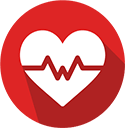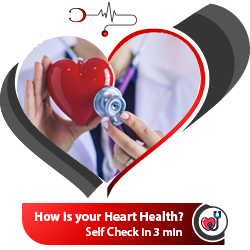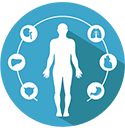Warning Sign of Cardio Vascular Diseases During Covid-19
Over the past few months, the world has seen a rapid escalation in cases of COVID-19. Morbidity and mortality have been on an ever-rising scale. We have also seen an increase in social distancing measures like school closures, cancelling of sports events, cancelling of flights, social gatherings etc. Hygiene measures like hand sanitization, use of masks are being advocated and practiced around the world. These measures can reduce the risk of transmission of the virus and disease. However, we also need an urgent escalation in the testing, isolation and contact tracing as well as comprehensive health checkups.

Study says, in the initial phase of the COVID-19 lockdown, people were reluctant to undergo the health screening at various healthcare facilities. However, in the last couple of months, people have started realizing the importance of health check-ups for their overall wellbeing. Moreover, the emerging data from across the world has emphasized that certain co morbid conditions like heart diseases, diabetes, etc. are high risk conditions for COVID-19 and hence proper management to keep them in control are very imperative especially in this pandemic situation.
Indus Health Plus data based on preventive checkups across India depicts the rising burden of heart conditions in our country. The abnormalities were observed in specific investigations like total cholesterol levels, triglyceride levels in the blood, which are considered to be major contributing factors for developing heart disease, and basic imaging like 2D Echo and even higher imaging like CT angiography of the heart to understand the heart status in detail. The percentage of abnormal CT angiography test was observed in various geographies that include cities like:
Metros and Tier - I:
- Mumbai: 43% in males and 21% in females
- Pune: 30% in males and 23% in females
Tier-II and Tier III:
- Indore: 29% in males and 18% in females
- Akola: 38% in males and 43% in females
- Ratnagiri: 39% in males and 30% in females
This emphasizes the need of early detection and lifestyle modifications across the country.
Based on the findings of imaging techniques of the heart like 2 D Echo and advanced screening techniques like CT coronary angiography done it was observed that a large percentage of the population especially in the age group of above 40 years had evidence certain of heart abnormalities which were either at an early developing stage or at a stage which required medical intervention.
The observation was that 17% of the males had abnormal total cholesterol values, with 2% males being in the borderline category meaning that they had mildly deranged levels. In females this percentage was about 21% and 2% respectively. Abnormal triglycerides percentage in males was 25% and in females it was to the effect of 17%. This data hence shows that the gender predisposition of heart conditions is almost equal. Thus, even the female population is equally susceptible to such diseases, contrary to the previous belief that males are more likely to contract heart conditions due to hormonal variations.
Screening done for an overall client size of 20,000 comprising of around 5,000 each from Mumbai and Pune, 1,000 each from Ratnagiri and Indore, Akola contributing 800 client size. The pattern in Metro cities when compared with other towns / cities brings the alarming fact to light that that these conditions are slowly creeping in across all cities and towns as well. The graphs below highlight the mentioned trend as the percentage of abnormal blood cholesterol levels ( 17% in males and 24% in females) in the city of Mumbai compares to that of smaller cities like Akola (15% in males and 20% in females)
With such high percentage of the population having heart disease or its risk factors is again a warning sign in the current scenario of COVID 19 where managing the associated risk factor becomes essential to the overall management of this viral disease.
An important aspect of lowering risk of such diseases is by following a combination of three key approaches:
- Lifestyle Changes: It involves modifications in health behaviors such as diet, physical activity, and habits like smoking, alcohol, tobacco consumption
- Regular Screening: Routine check-up for the parameters like Blood Pressure, Lipid profile, Blood glucose etc.
- Genetic Screening: This is about knowing the genetic risks for various health conditions including those of cardiovascular diseases. In addition, it also helps in systematically planning the regular health checkups.








